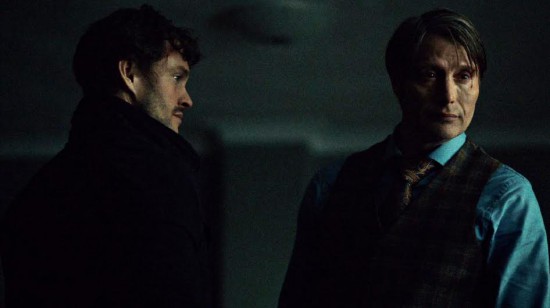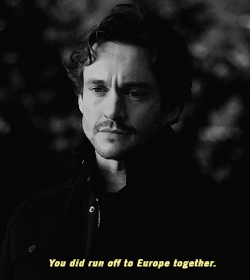Love for the Fannish Archive: Fuller’s Hannibal as Fanfiction
Post by KT Torrey, Virginia Tech
[Note: This is the second of a three-part series highlighting some of Hannibal‘s unique contributions to the television world, in commemoration of its final week on NBC. See Part 1 here, and tune in tomorrow for the third installment. Finally, please note that this post contains spoilers through episode 3.9]
Throughout the series’ three-season run, Hannibal showrunner Bryan Fuller has asserted that he regards the show as fanfiction: an affectionate remix of elements from Thomas Harris’ novels Red Dragon and Hannibal Rising, as well as from previous adaptations of those works. Hannibal, then, is transparent about being one of many “proliferations of shared sources” that comprise the “metaphorical archive” of the fandom’s fiction (De Kosnik 119). In positioning the series as fanfiction, and he and his team as fanfiction writers, Fuller claims the identity and ethos of not just a fan, but a feminine-gendered fan, those most maligned and oft-mocked in many media depictions of fandom. With that ethos in hand, Hannibal-as-fanfic has chosen to intertextually and ardently acknowledge both the practices and the affect of its primarily female fandom—allowing Fannibals to see some part of themselves, of their fannish identity, reflected back with love from within the series itself.
Hannibal treats the repetitive nature of fanfic—stories that “play out” a multiplicity of variations of the same basic story—as a source of narrative strength: because in repetition, the series suggests, there is possibility (ibid). Within a fandom’s archive, as Will puts it: “Everything that can happen, happens. It has to end well and it has to end badly. It has to end every way that it can” (Hannibal, “Primavera” 3.2). The archive is always in the act of Becoming, and, as Abigail De Kosnik argues in “Fifty Shades and the Archive of Women’s Culture,” that ongoing evolution asks fans to repeatedly engage with the archive’s contents, old and new, and to determine for themselves which stories “satisfy, which . . . liberate, and which . . . alienate” (De Kosnik 120). In this way, fans perform a careful cultivation of their preferred variations of the narrative and sketch out their own corner of the archive—their “fanon”—which captures the story elements they most enjoy (ibid).
As fanfic—as a fan-authored text, albeit a network televised one—Hannibal openly acknowledges that it’s both a product of fannish cultivation and a participant in a wider ecology of fannish production. The events of episode 3.9, “…and the Woman Clothed with the Sun,” for example, underscore Fuller and company’s awareness of—and affection for—contributions that fans themselves have made to this shared archive during the series’ run.
In this scene, a reluctantly un-retired Will Graham is prowling the scene of the Tooth Fairy’s latest murder when he’s confronted by tabloid journalist Freddie Lounds. Will hasn’t seen Freddie years—since he pretended to kill her in order to impress Hannibal at the end of season two—but he’s clearly been keeping up with her work at Tattle Crime.
Will: I’m not talking to you.
Freddie: We’re co-conspirators, Will. I died for you and your cause.
Will: You didn’t die enough. You came into my hospital room while I was sleeping, flipped back the covers, and snapped a photo of my temporary colostomy bag.
Freddie: I covered your junk with a black box. A big black box. You’re welcome.
Will: You called us ‘murder husbands’!
Freddie: You did run off to Europe together.
What’s important here—aside from actor Hugh Dancy’s delicious facial expression—is that “murder husbands” is a fan-generated term, one that some Fannibals use to describe the gorgeous, gory relationship between Hannibal and Will. Specifically, describing the men as “murder husbands” underscores the deadly potential of their pairing, something explored with particular aplomb at the end of season 2, when Will not only pretended to kill Freddie but actually did murder one of Hannibal’s former patients—whom Hannibal had sent to kill Will. With Hannibal’s lethal cunning and Will’s own capacity for violence combined, some Fannibals believe that “Hannigram” could form a deadly power couple and wreak beautiful, terrible havoc.
While other TV series like the CW’s Supernatural have invoked fan-created names for slash ships within their diegesis, what makes Hannibal‘s move distinctive is that the way in which “murder husbands” was incorporated points to a canonization of not only fans’ terminology but also of the slashy interpretive practices from which it arose. That is, Freddie’s breezy response to Will’s frustration—”Well, you did run off to Europe together”—suggests that Fuller and his writers anticipated one way in which fans might interpret the pair’s adventures abroad during the first half of season three. Of course, the men didn’t really run off together—Hannibal fled and Will chased after—but Freddie, like many fans, reads that pursuit and their eventual reunion as romantic in nature.
Further, putting the term in Freddie’s hands seems utterly in character; after all, “murder husbands” makes for great copy. But she’s also spent a lot of time writing about Will and Hannibal: dissecting their relationship, giving their stories her own special twist, and even contemplating Will’s, uh, “junk”—in essence, Freddie makes a living doing female fannish work. Thus, in calling out the “murder husbands,” she acts as a savvy avatar for the series’ female fans.
Ultimately, the invocation of “murder husbands” doesn’t read as either a mocking of fandom or as red meat tossed to keep the Fannibals at bay, but rather as a meaningful incorporation of fannish practice into the diegetic narrative. The canonization of “murder husbands” reflects Fuller and company’s awareness that the shared archive of Hannibal fandom, of which the series is part, continues to evolve. By employing both fan terminology and interpretative practice within its narrative, Hannibal firmly positions both its own story and those of the Fannibals as co-equal parts of that archive’s transformative ecology.
In the context of the series’ cancellation, Hannibal‘s intertextual alliance with its fans is a source of hope a reminder that within the fandom’s archive, no matter what choices NBC makes, “Everything that can happens, happens . . . This is [just] the way it ended for us” (Hannibal, “Primavera” 3.2).







